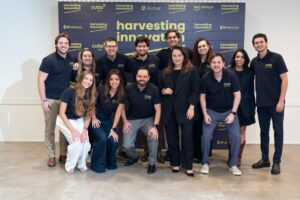Agriculture biotechnology (ag biotech) applies to all technologies used on the farm involving biological or chemical processes. It is a broad category involving many different types of technology and science, including breeding, genetics, microbiome research, synthetic chemistry, and animal health.
Large agribusinesses have been innovating in biotech for many decades to increase and protect crop yields with synthetic fertilizers, crop protection products like pesticides and genetically modified seeds. The ‘Big 6’ — Monsanto, BASF, Bayer CropScience, DuPont Pioneer, Dow Chemicals, and Syngenta — have created multi-billion dollar crop science businesses dominating the agriculture biotechnology market for decades. But startup companies are now adopting, embracing, and developing new capabilities in plant breeding, gene editing, biologicals, microbiome research and more to create new, and — they often argue — more sustainable input products to disrupt the status quo. Animal health ag biotech startups are also responding to consumer backlash against antibiotic use by creating alternative therapies.
The status quo is also changing on the back of a series of acquisitions that will see the ‘Big 6’ become the ‘Big 4’ with the recently completed merger of Dow and DuPont, and the pending mergers of ChemChina and Syngenta, and Bayer and Monsanto. This new landscape creates an interesting opportunity for startup companies to build businesses, if perhaps reducing the potential pool of acquirers.
There is already a lot of startup activity in ag biotech and the category was responsible for some of agtech’s first venture capital exits: AgraQuest, a biological pest control group that was backed by Finistere Ventures, Otter Capital, Generation Capital and TPG Growth among others, was acquired by Bayer for $425 million in 2012. Becker Underwood, a biological seed treatment company that had Norwest Equity Partners as an investor, was acquired by BASF in the same year for $1 billion.
Here’s a look at the key technologies in agriculture biotechnology, and some of the startups innovating today.
Genetics
There are several startups working to improve the efficiency of both animal agriculture and crop production via genetic engineering and discovery tools.
Startups involved in genetic discovery, which are identifying crop traits that are both beneficial and inhibitive of growth, may use this information for internal breeding or genetic engineering programs or license out their discoveries to others.
Benson Hill Biosystems (BHB) is an example of a genetic discovery platform that partners with seed companies in the use of its bioinformatic and machine learning-enhanced CropOS platform to discover traits and find products. BHB may or may not share in the upside of any sales and is not involved in the manufacture of products as a business.
TwoPore Guys has created a hand-held point of use diagnostic platform that examines DNA and RNA, and analytes — proteins, viruses, antibodies — in animals (and humans). It raised $24.5 million in Series A funding in April, according to our upcoming AgriFood Tech Report.
TL Biolabs, a startup offering $15 genomic tests for beef and dairy cattle, and the software needed to analyze the results, raised $4 million in seed funding earlier this year.
Gene editing
Working on discovery, but taking things one step further, are startups that are identifying beneficial or negative traits and using gene editing to edit them out or enhance beneficial ones. Caribou Biosciences is doing this on the crop side through its partnership with DuPont Pioneer. In animal health, Recombinetics is using gene editing to breed livestock with desirable characteristics such as the ability to withstand hot climates.
There are a few different gene editing tools; the most famous is CRISPR-Cas 9, which Caribou is using. Others use TALENS and BHB has created its own version of CRISPR Cas-9 called CRISPR 2.0. The differences between these tools are for another post, but it revolves around the type of enzymes used to track and then cut DNA to make edits.
Genetic modification
This is the next step, where similar genetic discovery and editing tools are used, but foreign genes are inserted to produce desirable characteristics for growth. ZeaKal is an example of a startup using GM in soybean seeds to produce greater quantities of oil. AquaBounty, a microcap listed company, raised $25 million this year for its genetically modified salmon that’s approved for human consumption.
Roslin Technologies, which raised £10 million ($12.4 million) in Series A funding earlier this year, uses genome sequencing, gene editing, transgenics, phenotyping, and bioinformatics. Its first product revolves around a protein researchers have engineered in transgenic chicken eggs that can help to regenerate livers. It has therapeutic applications in the pork industry — to prevent production losses in early weaned pigs by boosting their immune system — and also for animals and humans that have overused paracetamol (like Tylenol), negatively impacting their liver function.
Synthetic chemistry
Since the green revolution in the 1960s, advances in chemistry enabled the production and adoption of fertilizers and pesticides across the globe, not just in developed markets. Their use is still widespread today, and where allowed, they are often used in conjunction with GM seeds that have been engineered to withstand high quantities of herbicide without damaging the crop. There are not many startups in this field as tolerance and acceptance of synthetic ag products has waned among consumers and industry in recent years, with environmental and health fears gathering pace. Crop Enhancement is an example of one startup that’s using what it dubs “sustainable chemistry” to combat crop pests and increase crop yields in the tropics, but with a focus on minimizing the use of pesticide sprays and the impact of its products on the surrounding environment.
Microbiome research and biological products
Concerns about the overuse of synthetic products in agriculture led to an increase in the number of companies researching naturally occurring, biological alternatives, in particular microbial or bacterial solutions.
One of the first startups to develop biological crop inputs was AgraQuest, which was acquired by Bayer in 2012 and formed the basis of the German agribusiness’s biologicals platform today.
In recent years, research of the plant microbiome — the environment of bacteria and critters in and around the root zone of a plant — has accelerated as scientists seek to understand how these organisms contribute to the growth of the crop, and to soil health.
Now, startups are trying to identify and isolate the organisms that are most beneficial in different environments and to create products based on them. Indigo is one of the most advanced in this space, and in 2016 released its first product, a microbial seed coating for cotton to promote growth in drought conditions. Other examples are Inocucor, Aphea.Bio and NewLeaf Symbiotics.
There are also biological products on the crop protection front with biopesticides that aim to tap into the trend for organic and pesticide-free food. Terramera is an example of a particularly novel biological solution for pests. The Vancouver, Canada-based startup uses a molecular delivery system to enhance the efficacy of bio-pesticides.
Biome Makers is an example of a startup researching the soil biome to create a microbe database service for vineyards using bio-informatics.
On the animal health side, Bactana Corp is developing microbes that improve animal health and increase the efficiency of dairy and beef cattle, such as improved weight gain or reduced susceptibility to disease.
The startup uses new techniques in molecular science and DNA sequencing to identify and develop products. It raised an undisclosed Series A round of funding in H1-2017, according to the upcoming AgFunder AgriFood Tech Report.
Animal feed
This subsection of ag biotech encompasses a range of different technologies and processes, largely focused on improving the efficiency of feed as well as the health of animals.
Agrivida is an animal feed additive startup using the corn plant as a factory to produce enzymes that will promote efficiency in poultry, swine, dairy, and beef cattle.
Calysta produces feed, as well as energy and other industrial materials, through the biotransformation and gaseous fermentation of sustainable, low-cost feedstocks such as soil and methane. It raised $40 million in Series D funding this year from Japanese trading house Mitsui & Co, and including Singapore state investment fund Temasek.
Arvegenix develops, genetically improves, and commercializes field pennycress as an oilseed crop that is used to produce oil for industrial and renewable fuels, as well as meal for nutritious livestock feed. It raised $2.4 million in an extension to its Series A round from a series of investors including Monsanto Growth Ventures, according to AgFunder data.
Stay tuned for the AgFunder AgriFood Tech Report coming out soon for more in-depth investment data on ag biotech and other categories! Sign up to our newsletter to make sure you receive the report!





